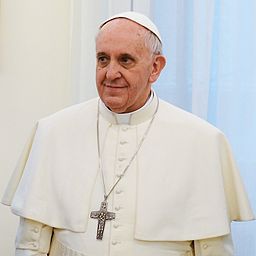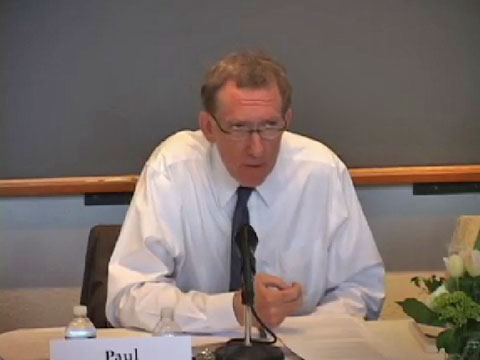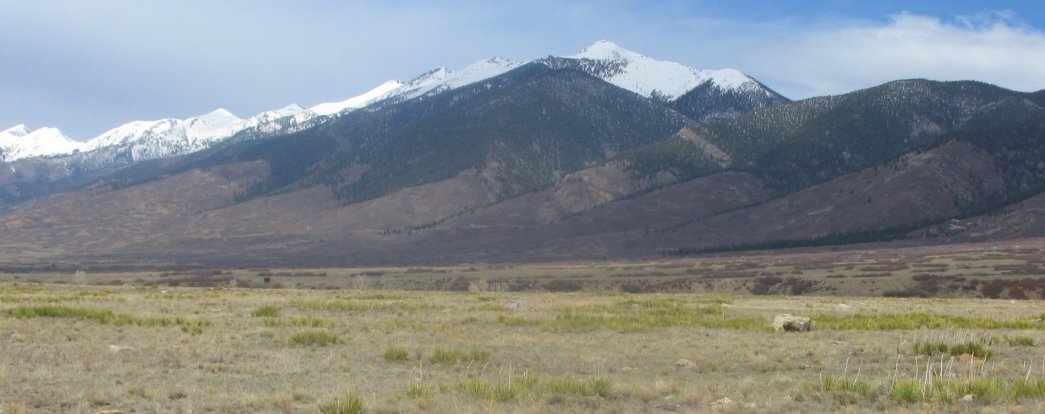 It’s here! A new social encyclical! As a Catholic moral theologian, I feel a bit like a child on Christmas morning. While I know that most of you were not setting your alarms for the 5am Vatican press conference, we have all been anxiously awaiting Pope Francis’s “environmental encyclical.” And, let me just say – you will not be disappointed. The Holy Father has delivered an amazing tour de force in a jam packed 100+ (!) pages.
It’s here! A new social encyclical! As a Catholic moral theologian, I feel a bit like a child on Christmas morning. While I know that most of you were not setting your alarms for the 5am Vatican press conference, we have all been anxiously awaiting Pope Francis’s “environmental encyclical.” And, let me just say – you will not be disappointed. The Holy Father has delivered an amazing tour de force in a jam packed 100+ (!) pages.
Pope Francis invites us to work together, challenges us to take a long hard look in the mirror at our relationship to the earth, and reminds us the Lord hears the cries of the earth and the cries of the poor, and so much we.To get you started – here are 5 initial things to note in Laudato Si’:
1. Care for our Common Home – which is in crisis
Pope Francis addresses this encyclical to “every person living on the planet” and invites them “into dialogue with all people about our common home.” (3). This is new – from 1891 til 1963, social encyclicals were only addressed to the Church. In 1963, Pacem in Terris was different. ST. John 23rd invited all people of good will to consider the need for peace on earth. Laudato Si’s universal audience is an extension both of the universality of the ecological crisis and of Catholic social teaching’s understanding that we are ONE human family. He invites everyone to participate because we can – all of us can cooperate as instruments of God for the care of creation, each according to his or her own culture, experience, involvements, and talents” (14). This invitation is not a passing one – it is life-long. Pope Francis invites us into a relationship, calls us to conversion, and implores us to act recognizing that “these questions will not be closed and left behind, but reframed and enriched again and again” (16) throughout the encyclical and our lives. This is of utmost importance because, as Francis notes, “when we speak of the ‘environment,’ what we really mean is a relationship existing . . . nature cannot be regarded as something separate from ourselves . . . we are a part of nature, included in it and thus in constant interaction with it” (139).
2. Climate is a Common Good
Throughout, Pope Francis emphasizes there is no private planet. Quite clearly, he states, “The climate is a common good, belonging to all, meant for all” (23). This leads him, as expected, to recognize “a very solid scientific consensus” (23) on global warming as the result of human activity. This affects animals forced to migrate and vulnerable human populations who are now climate refugees – both of whom have little to no protection. Among the strongest indictments comes when he addresses the loss of biodiversity: “because of us, thousands of species will no longer give glory to God by their very existence nor convey their message to us. We have no such right” (33). This echoes the witness of Sr. Dorothy Stang, who gave her life fighting for the climate and indigenous communities in the Amazon Rainforest. We have forgotten that the climate is a common, not a private good. Ecosystems are a common, not a private good. This requires us to be farsighted considering our responsibilities for ecosystems and future generations; but we rarely consider the “cost of the damage caused by such selfish lack of concern” (36) for the biodiversity and biospheres upon which we rely.
3. Creation belongs to God, It’s Not Ours
“We are not God. The earth was here before us and has been given to us” (67). The need for humanity to be humble and the dignity of creation are overarching themes of Laudato Si’ . Pope Francis interprets Genesis as establishing a mutual relationship between humans and the nature asserting that “the Bible has no place for a tyrannical anthropocentrism unconcerned for other creatures” (68). Our relationship to God is intimately connected not only with our relationship to our neighbors but also to nature. One cannot be in right relationship with God if one is not in right relationship with neighbor and with nature. Failure to care for both, “ruins my relationship with my own self, with others, with God and with the earth” (70). We have been given a great responsibility but it requires we recognize God, not humanity is primary. Francis implores us to remember the dignity and fragility of nature; “A fragile world, entrusted by God to human care, challenges us to devise intelligent ways of directing, developing, and limiting our power” (78). The most radical aspect here is Francis re situates our attention on God as Creator prior to any discussion of the universal destination of goods and private property. Catholic social teaching has long held the universal destination of goods is primary and foundational. Pope Francis here locates it as the primary starting point for social ethics –but in refocusing our attention on Creation as belonging to God, we are reminded that all our claims of private property are really as mere renters, not owners. This is a horribly inadequate summary of what is for me one of the most exciting parts of the encyclical – Francis attends to inter-generational justice, inequality in development, introduces the concept of “ecological debt” the developed world owes to the developing world….I could go on. But, the deep social ethics and reflection on justice here falls within the broad theological vision of creation that provides the core of this encyclical.
4. These are Right to Life Issues
Concern for Life and Dignity are integrated in all aspects of Catholic social teaching and this is no exception. Pope Francis criticizes those who seek to justify abortion in the name of protecting the environment (120). He notes, “When we fail to acknowledge as part of reality the worth of a poor person, a human embryo, a person with disabilities – to offer just a few examples – it becomes difficult to hear the cry of nature itself.” (117).The cries of the poor and the cries of nature are intimately linked. More specifically though I’d like to highlight two right to life issues highlighted in this text:
Water is a right to life issue. Water is essential for all life. Addressing both the health of our oceans, Francis identifies the lack of access to safe drinking water as a widespread human rights violation. Early in the encyclical he states, “access to safe drinkable water is a basic and universal human right, since it is essential to human survival . . . our world has a grave social debt towards the poor who lack access to drinking water, because they are denied the right to a life consistent with their inalienable dignity” (30).
Consumption is a right to life issue. In a stinging critique of the developed world and those who would simply label overpopulation as the cause of environmental crisis, Pope Francis states, “to blame population growth instead of an extreme and selective consumerism on the part of some is one way of refusing to face the issues. It is an attempt to legitimize the present model of distribution where a minority believes it has the right to consume in a way that can never be universalized”( 50).
5. St. Francis Rocks!
Pope Francis channels his namesake from the very opening Praise be to you, my Lord. St. Francis of Assisi provides the frame, spirituality, and inspiration for this beautiful document. As the Holy Father notes, St. Francis “shows us just how inseparable is the bond between concern for nature, justice for the poor, commitment to society, and interior peace” (10). Echoing St Francis, the encyclical begins with sister earth who “cries out to us because of the harm we have inflicted on her by our irresponsible use and abuse of the goods with which God has endowed her.” (2) The Canticle of Creatures is seamlessly incorporated as the logical song in our hearts when we realize God is in all things (87). “Everything is connected and we human beings are united as brothers and sisters on a wonderful pilgrimage woven together by the love God has for each of his creatures and which also unites us in fond affection with brother sun, sister moon, brother river, and mother earth.” (92). Franciscan spirituality invites us to “ecological conversion” (217) and reconciliation. St Francis’s inspiration continues through to the end of the encyclical where the Holy Father invites us to pray with him in a prayer for our earth and a Christian prayer in union with creation.

Laudato Si’ invites all of us into the conversation and to act – Pope Francis has given us a firm place from which to start. Myself and others will be continuing to reflect on the encyclical here at CMT, at America Magazine, at Daily Theology and over at Millennial . Join Us.






I don’t know. The Pope is so articulate and so much of what he says here is so wise, and yet I must admit, I am disappointed.
It seems it would have been far more serious and effective to set aside the sweeping high level theology in favor of a call to action for a single specific change in Catholic’s daily lives. My favorite pet idea is to challenge all Catholics to become vegetarians, but it doesn’t have to be that, just something as simple and effective as that.
Catholic leadership on the environment can not be established by the Pope giving wonderful sweeping sermons and individual Catholics taking a random collection of little actions in their own private lives. That’s good, but it’s missing the real opportunity, Catholic leadership.
Catholic leadership on the environment can be established by Catholics uniting behind a single easily identified specific action, and accomplishing it together as a community. As example, imagine a billion human beings becoming vegetarians in a single year.
That’s not just a speech, it’s a story. It’s an inspiring story which both proves what working together can accomplish, and a story which offers a specific example all other human beings can follow. If anyone should understand how to craft a compelling story which inspires the whole planet, it should be Catholics!
Not skilled Catholic sermons. Skilled Catholic leadership. There’s a difference.